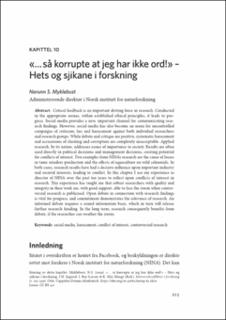«… så korrupte at jeg har ikke ord!» – Hets og sjikane i forskning
Chapter
Published version
Permanent lenke
https://hdl.handle.net/11250/3060089Utgivelsesdato
2019Metadata
Vis full innførselSamlinger
- Antologikapitler [15]
- Publikasjoner fra CRIStin - NINA [2364]
Sammendrag
Myklebust, Norunn Sæther.
«… så korrupte at jeg har ikke ord!» – Hets og sjikane i forskning. I: Interessekonflikter i forskning. Cappelen Damm Akademisk 2019 ISBN 978-82-02-58817-5. s. 215-230
Critical feedback is an important driving force in research. Conducted in the appropriate arenas, within established ethical principles, it leads to progress. Social media provides a new, important channel for communicating research findings. However, social media has also become an arena for uncontrolled campaigns of criticism, lies and harassment against both individual researchers and research groups. While debate and critique are positive, systematic harassment and accusations of cheating and corruption are completely unacceptable. Applied research, by its nature, addresses issues of importance to society. Results are often used directly in political decisions and management decisions, creating potential for conflicts of interest. Two examples from NINA’s research are the cause of losses in tame reindeer production and the effects of aquaculture on wild salmonids. In both cases, research results have had a decisive influence upon important industry and societal interests, leading to conflict. In this chapter I use my experience as director of NINA over the past ten years to reflect upon conflicts of interest in research. This experience has taught me that robust researchers with quality and integrity in their work are, with good support, able to face the storm when controversial research is publicised. Open debate in connection with research findings is vital for progress, and commitment demonstrates the relevance of research. An informed debate requires a sound information basis, which in turn will release further research funding. In the long term, research consequently benefits from debate, if the researcher can weather the storm. social media, harassment, conflict of interest, controversial research

